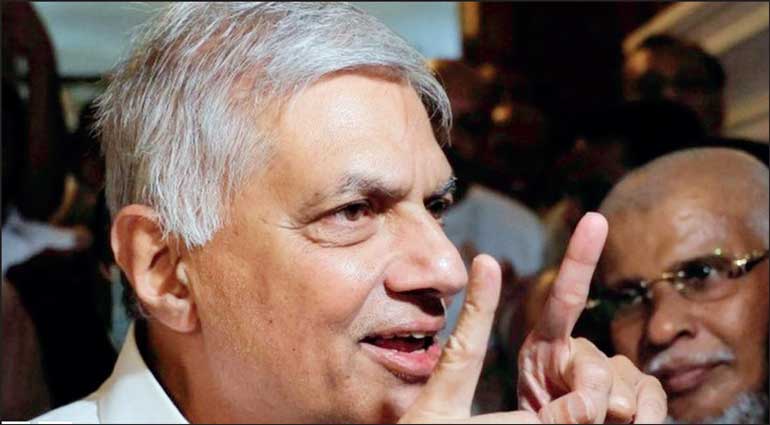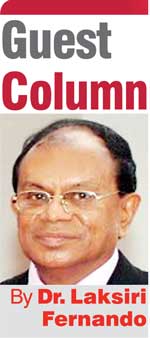Friday Feb 13, 2026
Friday Feb 13, 2026
Wednesday, 8 March 2023 00:09 - - {{hitsCtrl.values.hits}}

 Reading news from Sri Lanka is depressing. Suffering of the people due to cost of living, loss of employment or small businesses, and breakdown of welfare assistance from the Government, are some of the reasons. News from daily life of the people is also disheartening being full of crime, family violence, cheating, drug use, and stealing. All these are symptoms of a deeper crisis in society and a breakdown of a value system.
Reading news from Sri Lanka is depressing. Suffering of the people due to cost of living, loss of employment or small businesses, and breakdown of welfare assistance from the Government, are some of the reasons. News from daily life of the people is also disheartening being full of crime, family violence, cheating, drug use, and stealing. All these are symptoms of a deeper crisis in society and a breakdown of a value system.
The day-to-day language (yako, uba, thopi, thow) that people use, as evident from some teledramas, and social media is also clear of a social degeneration. Under these circumstances no one can blame the young people and the educated who try to migrate to other countries for living or for work.
The behaviour, the actions and the explanations of the politicians are a deeper reflection of the above situation who are also mainly responsible for the country’s deepening crisis. Take the example of the President. It is the duty and the responsibility of a country’s leader to reveal and explain his or her positions to the country, and even to the international community, about important policy matters.
Elections and joke
In a democracy, there is nothing more important than elections. It was well known that local government elections were due in March. First, the President was obliquely silent. Then he started joking about it saying, “There is no elections to be postponed!”
There is no problem to the people that this President is a jovial man. But there should be a limit. He should not repeat his Royal College jokes especially when the country is in dire straits. It is good that he often appears in Parliamentary debates. But his behaviour, arguments and jokes in those debates are reprehensible.
When he was appointed as the Prime Minister by Gotabaya Rajapaksa, he even joked about the economy. He said, “We invite tourists. They even can join the protests!” The given photo is by the BCC on this matter showing his jovial gestures. He even joked about the former British Queen just two days before her death which became condemned by many international journalists. What a Joker! It is difficult to believe that he is serious about democracy or the economy. It is more difficult to believe that he will be trusted by the IMF although they might give priority to the country.
There is no doubt that compared to many other political leaders of the country he has some economic knowledge and experience. As a Minister (Finance or in charge of the economy) he can be good. But as the President of the country, he has so far proved to be hopeless, useless, and intolerable.
Importance of local government
The local government system in Sri Lanka has a long history as Gam Sabha (village councils). It is not something just introduced by the British. Both the Colebrook Commission and the Donoughmore Commission acknowledged their importance. However, it was the British who introduced franchise to the system now under threat from the present President. It is difficult to believe that Philip Gunawardena’s son, as the Prime Minister, would oppose the elections. The President undoubtedly is the culprit. From what heritage has he got this undemocratic orientation?
Of course, there are some weaknesses within the local government system. But who have created them? Present day politicians have done so. One of the major weaknesses of the present day politicians is their rigmarole manner in addressing crucial economic, political and social problems. They appoint committees (or commissions) and committees and produce reports and reports. They are in the absence of commonsense, principles and practicalities. They change positions very easily and forget what they have said or promised even the last week! The reason is that they have come to politics for opportunistic purposes. Under the present ‘preferential voting’ system, it is difficult for the ordinary, the educated and genuine people to come into politics unless they go behind the opportunistic leaders.
The heritage?
The present President has a more precise heritage. It is not directly related to his family except they all were rich and cherished personal wealth directly and indirectly. Wickremesinghe’s heritage is more of something created by him. It is about power, glory and perhaps fun! He has been the Prime Minister for five times in the past without delivering much, except creating crisis from crisis. Can he deny that he was involved in the Batalanda torture and violence? This was revealed by a commission, although no action was taken against him.
It appears that Ranil Wickremesinghe particularly has a hatred against youth from lower social classes.
Of course, no one can condone what the JVP has done in the past. Even at present they should be more careful not to ignite violence or unnecessary trouble in the country. But there are/were indications that they are at a reform path, and this is something that should be strengthened without condemning all their actions and policies. Even in genuinely creating good governance (Yahapalanaya) they tried their best to support and participate. These principles also should apply to former LTTE supporters and even remaining sections.
There is a major task in the country to reform and reorient the youth for democratic processes and encourage them for positive, creative, and responsible activities. This cannot be done unless the established political parties and leaders like Wickremesinghe, Kumaratunga or Premadasa take a positive attitude towards the JVP or the NPP. The universities, academics, and civil society organisations (NGOs) also can play a pivotal role in this endeavour if they free themselves from narrow party politics or similar orientations. A constructively worked out strategy is necessary.
Violence and non-violence
During the Aragalaya (struggle) last year, incursion and occupation of the Presidential Office and Presidential House were perhaps inspired by what happened in America after the last elections. However, the invasion and damaging of Wickremesinghe’s private home was different and cannot be condoned by any means. Likewise, the attacks and burning of over 60 houses belonging to the government MPs also were despicable. If (or as) the JVP was involved, there is a necessity of soul searching in the country. Otherwise, the country would soon drag into the situation of 1980s.
Even if the JVP (or NPP) was involved in these violence and violations, the President should not behave in the same manner. That is not expected from a democratic leader. This is not merely a defect of the presidential system. This is about the broader political system and qualities of the political leaders.
In coming straight to the recent situation, the way the police handled the protest march organised by the JVP and the National People’s Power (NPP) on 26 February in Colombo was reprehensible. Who was behind it? There cannot be any doubt that it was the President. Those parties and others have every right to protest over the virtual sabotage of the local government elections by the President. One has died and 28 others were hospitalised because of police attacks at these protests. Although only water and teargas were used, those were enormous and brutal.
In sabotaging the local government elections, planned to be held on 9 March, the reason given was lack of funds. However, millions of funds were spent on Independence Day celebrations for the armed forces. Instead of the military, schoolchildren should have been mobilised for the occasion. The election is not an ‘essential service,’ according to the President! The Speaker has agreed however now to allow the Parliament to put forward a resolution to allocate necessary funds for the local government elections. Parliament is supreme. If it is approved (no doubt) the elections could be held somewhere in April.
However, there are other matters to be considered. Majority of the trade unions were on (token) strike on 1 March against the new high taxation and coercion against the working class. The situation reminds of the year 1980 where the present President’s ‘maha-guru’ (big teacher), J.R. Jayewardene took measures to attack the working people and the trade union movement as a measure of economic reform. This is again the trend today.
Under the present circumstances, it might be good for the country to go for an overall political change by holding both Presidential and Parliamentary elections together and look for a new economic agenda with the support of the international community and closely friendly countries like India, China, Japan, EU, and other countries. This will save money and possibly bring a new agenda for democracy and development.